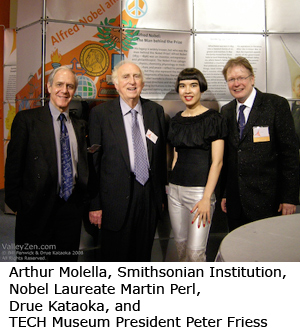100 Years of the Nobel Prize Comes to the Valley

“This exhibit was carried around by Indian elephants,” said Peter Friess, President of The TECH Museum of Innovation, on a gala evening celebrating “100 Years of the Nobel Prize” and its installation at The TECH. Traveling through India, China, Egypt, and now Silicon Valley, the exhibit was conceived in the spirit of the Nobel Prize as an international project. Watch video of Friess talking here (or embedded below).
How it Began – A Treasure Hunt
Nobel Laureates, TECH board members, and media listened as Friess explained the genesis of the exhibit. Arthur Molella, Director of the Smithsonian Institution’s Lemelson Center in Washington D.C. and Friess, then at the Deutsches Museum Bonn, collaborated as “key leadership team members” to launch the exhibit. Friess and Molella developed a unique concept for their two institutions. They distributed treasure hunt maps for museum visitors. Visitors were invited to discover the Smithsonian and the Deutsches Museum by searching for Nobel related objects. Interestingly, added Friess “[t]hose two institutions – the Smithsonian and Deutsches Museum combined probably held more Nobel objects than anywhere else in the world.”
10 Years Later
10 years later Friess and Molella realized their vision for the “100 Years exhibit.” Currently on display at the TECH (until May 23), it includes life-size Avedonesque photos of Nobel Laureates by German photographer Volker Steger and video displays.
1995 Nobel Laureate in Physics Martin Perl and 1980 Nobel Laureate in Chemistry Paul Berg spoke eloquently about “100 Years.”
Zen Wisdom from a Nobel Laureate
I’ll take away a conversation with Martin Perl as a highlight of the evening. His eyes sparkled as he shared this Zen wisdom:
“I like to make something simple, or make the results simple. I don’t like complicated stuff.”



Fun video. I don’t know if your text overlays qualify as zen, but they’re definitely amusing. Which makes me wonder about the relationship about zen and humor: do they naturally co-exist? Are certain types of raucous humor innately un-zen? Or does a meta-zen require a certain balance of non-zen elements in one’s life?